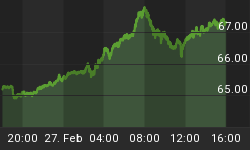Summary
Last Friday, Wall Street suffered instashock, when the US Commerce Department reported that fourth-quarter real gross domestic product only had expanded at a 1.1% annual rate. Colleague, John Williams, and I were shocked, too, but for considerably different reasons!
Introduction
John and I spend much of our respective analytical time criticizing the accuracy -- occasionally, even the outright honesty -- of the government's economic numbers. Understated inflation and overstated employment growth are a couple areas that are among our favorite targets. But overstated economic growth gets a good deal of attention, as well. After all, the automatic consequence of consistently understating inflation is to consistently overstate the economy's real growth.
So when along came a GDP report that appeared to us to portray more accurately the economy's actual condition, it was at least a mild shock. On the other hand, Wall Street's shock was driven by a materially different reason and motivation. If you are out heavily promoting a "Goldilocks" environment, the last thing you need is a report showing the worst economic growth in three years. In fact, growth that actually came in negative, if you place analytical importance on real final sales. (We do!)
A few highlights:
* The Commerce Department's first ("advance") estimate of fourth-quarter 2005 gross domestic product indicated real growth during the period at a 1.1% annual rate, versus a 4.1% rate during last year's September quarter.
* During last year's final quarter, real final sales (GDP net of inventory change) actually contracted at a 0.3% annual rate.
* Measured in nominal (pre-inflation) terms, fourth-quarter 2005 GDP rose at a 4.2% rate, down sharply from the 7.6% rate of nominal growth during last year's third quarter.
* Measured on a 4Q2005-over-4Q2004 basis, real GDP in 2005 grew by 3.1%.
* The report also showed a highly "stagflationary" mix in the numbers. Real GDP was a mere 26% of nominal GDP.
* The consensus estimate for real fourth-quarter growth had anticipated something around a 2.8% annual rate, far above the 1.1% rate actually reported.
This launched Wall Street into a mode of maximum spin, and at warp speed, too! The defense mechanism immediately employed by the Street (and others) was to impugn the data's accuracy and sensibility, in the process, assuring everyone the data would be revised to better readings in February, when Commerce publishes its next estimates.
An overall upward revision very well may occur, but surely not to a level that will make the Street (and others) overly ebullient. After all, were Commerce to revise last week's number up by 100% (terribly unlikely), the 2.2% real GDP growth that would result would still be well below the roughly 2.8% the consensus forecast was envisioning.
We believe last Friday's numbers, as rendered, were not as outlandish as some would have people believe. The balance of this missive at Gillespie Research will provide some of the reasoning: http://www.gillespieresearch.com/cgi-bin/s/article/id=755.















